
Business Transformation
Unlock potential with our expert strategies and innovative solutions tailored for your organisation's success.
Business Transformation Services
Empowering organisations to innovate and adapt through strategic transformation solutions tailored to your needs.
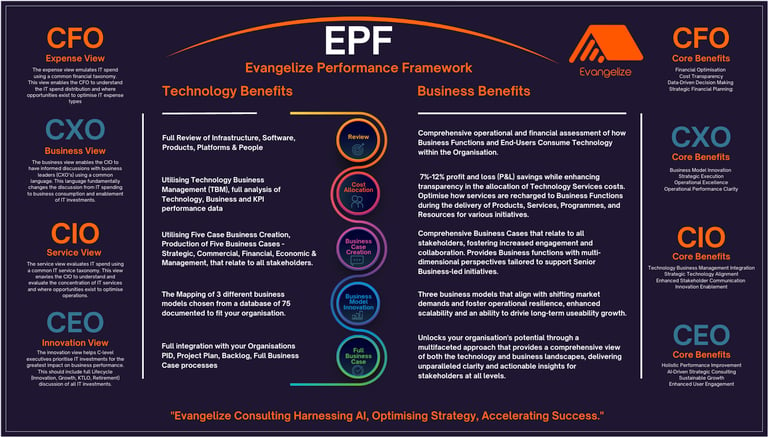

Successful digital transformation requires a cultural change where employees are encouraged to challenge traditional practices, embrace new ideas, and not fear failure. Evangelize Consulting is committed to building the platforms necessary for this transformation, fostering a culture of engagement, and capturing innovative output that drives strategic success.
Transforming Business with AI
Digital transformation is about more than just technology—it’s about reimagining how an organisation delivers value by fully integrating digital technology across all areas of the business. This shift aims to increase value through innovation and efficiency while driving a culture of growth, adaptation, and proactive risk management.
The Evangelize Performance Framework
A Performance Framework that captures both the Technology and Business Landscape
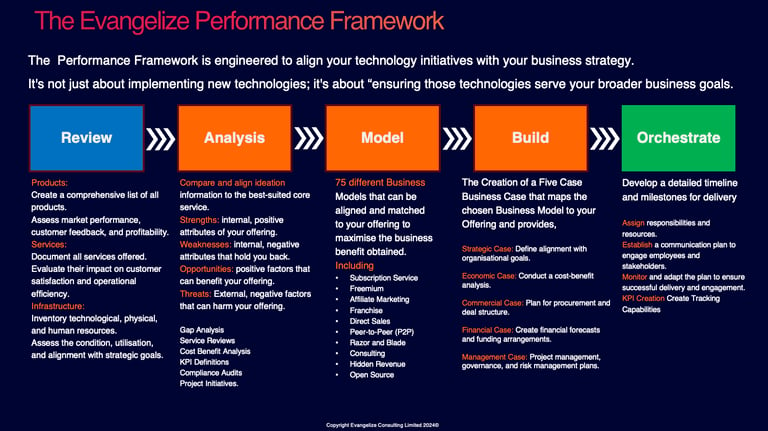

Five Stages of Cost Effectiveness
The Evangelize Performance Framework (EPF) is a proprietary, five-stage methodology developed by Evangelise Consulting to empower organisations, particularly CIOs and CFOs, to optimise technology investments, reduce operational costs, and align IT capabilities with strategic business objectives.
The framework’s structured approach—Review (baseline establishment), Assess (inefficiency identification), Design (roadmap creation), Engage (stakeholder alignment), and Orchestrate (continuous optimisation)—enables organisations to achieve an average 10–20% reduction in technology costs (first pass) while enhancing operational agility and decision-making transparency.
By integrating Technology Business Management (TBM) principles, the EPF provides granular visibility into IT expenditure patterns, service-level economics, and resource utilisation, enabling data-driven prioritisation of investments and fostering stronger IT-business partnerships.
It has shown clear results in real-world use, such as cutting infrastructure costs by 20% and increasing revenue by 15% by shifting technology spending to more important projects. Additionally, the framework’s emphasis on stakeholder engagement and governance ensures sustainable transformation, positioning organisations to balance enterprise efficiency with innovation while mitigating risks associated with technology fragmentation and misaligned priorities
EPF at the centre of your Organisation
It is So Much More Than Total Cost of Ownership (TCO)
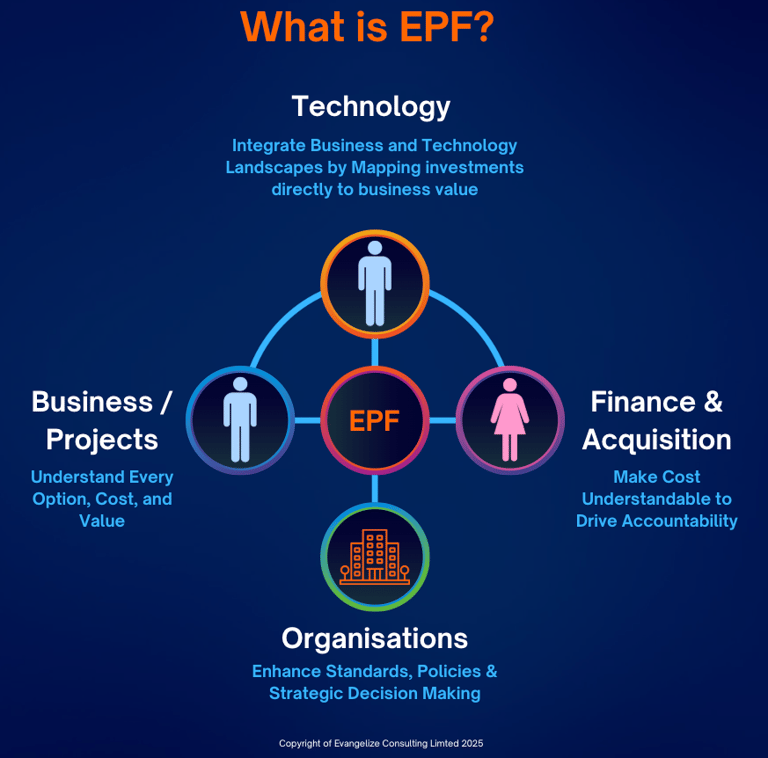

EPF the Centre of Transformation
The Evangelize Performance Framework transcends conventional cost management tools by ensuring transparency and resource optimisation, are interconnected disciplines.
Through its structured integration of TBM taxonomy, stakeholder engagement, and automation, the EPF enables organisations to achieve an average 10%–20% reduction in operational costs while aligning IT investments with strategic imperatives.
Adopters do not need to prioritise cultural alignment alongside technical implementation to ensure that transparency becomes an organisational philosophy rather than a one-time initiative, they will just need to implement EPF.
As digital transformation accelerates, frameworks like the EPF will prove indispensable for enterprises seeking to balance fiscal discipline with innovation agility.
Creating Value and Innovation
Our approach involves a strategic blend of reviewing data, engaging stakeholders, leveraging advanced AI toolsets, and delivering customised outputs.
We believe that cost savings are only worthwhile when they translate into smarter, strategic decisions that align business objectives with risks, supporting scalable growth and innovation.
Through the intelligent integration of technology initiatives with your broader business strategy, we create opportunities to innovate, lead markets, and achieve sustainable growth—setting you apart in a highly competitive landscape.
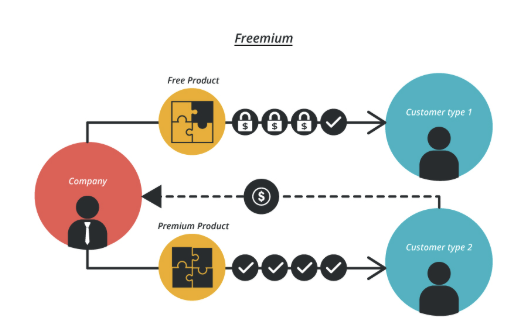

A Business Model for All Seasons
Below are three distinct commercial business models, each explained with its core mechanism and practical examples:
Subscription Model
In the subscription model, customers pay a recurring fee (monthly, quarterly, or annually) to access a product or service. This model provides predictable, recurring revenue for the business and convenience for customers, who benefit from ongoing access without repeated purchasing decisions.
How it works: The business offers continuous access to a product or service as long as the customer maintains their subscription. Examples include Netflix (streaming media), Zipcar (car sharing), and SaaS platforms like Microsoft 365 or Adobe Creative Cloud.
Benefits: Predictable cash flow for the business; lower upfront costs and ongoing value for customers.
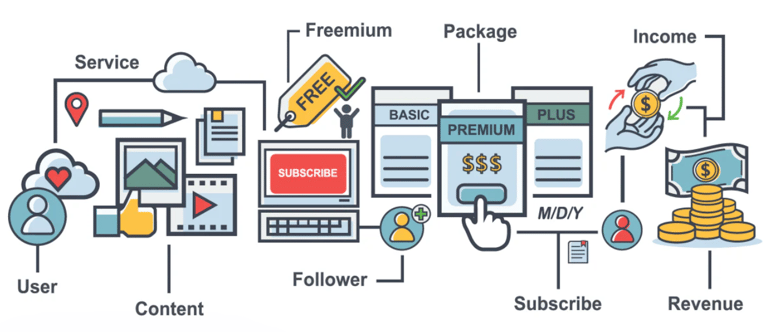

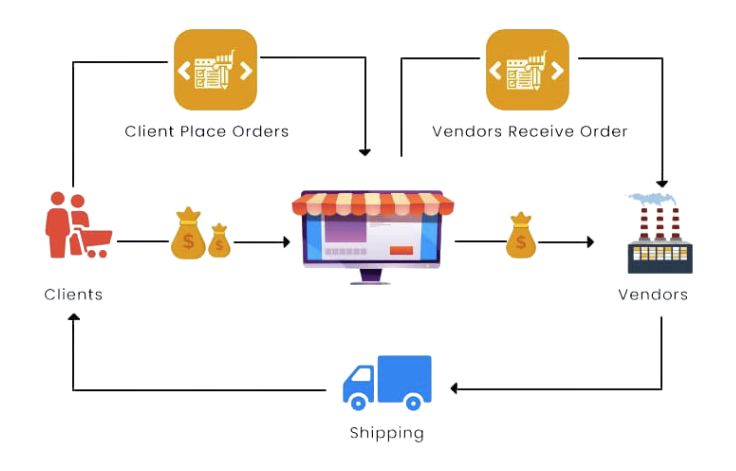

Freemium Model
The freemium model offers a basic version of a product or service for free, while charging for premium features, advanced functionality, or additional usage.
How it works: The business attracts a large user base with a free offering. A smaller percentage of users convert to paid plans for enhanced features or capacity. Examples include Spotify (music streaming), Dropbox (cloud storage), and LinkedIn (professional networking).
Benefits: Broad reach and rapid user growth; revenue from a subset of users who need advanced features.
Marketplace (Two-Sided Platform) Model
A marketplace model connects two or more interdependent groups, typically buyers and sellers, and facilitates transactions between them. The platform earns revenue through commissions, listing fees, or value-added services.
How it works: The platform provides the infrastructure, trust mechanisms, and tools for buyers and sellers to transact. Examples include eBay (auctions), Airbnb (accommodation), and Uber (ride-hailing).
Benefits: Scalable with network effects; the platform benefits as more users join each side, increasing value for all participants.

Contact Us for Business Transformation
Get in touch to start your transformation journey today.


